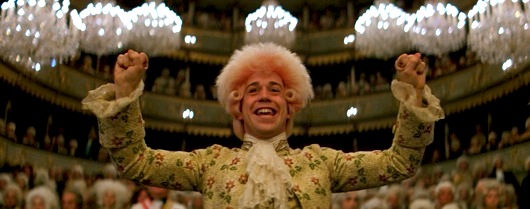 |
| Actor Tom Hulce portraying Wolfgang Amadeus Mozart in what would become the role of a lifetime. |
TCM is running Academy Award-winning movies all month long as a lead-up to this year's awards ceremony on February 27. Last night's feature was the 1984 musical bio-pic Amadeus. Written by Peter Shaffer and directed by Miloš Forman, the story is told from the perspective of Antonio Salieri who is delirious with fictionalized jealousy for a contemporary composer named
 Wolfgang Amadeus Mozart. Perhaps at first glance the project may not have appealed to a high-brow society that puritanically fills concert halls and opera houses but it manages to introduce moviegoers to wonderful Mozart compositions, some for the first time. "Amadeus is a magnificent film, full and tender and funny and charming -- and, at the end, sad and angry, too, because in the character of Salieri it has given us a way to understand not only greatness, but our own lack of it. This movie's fundamental question, I think, is whether we can learn to be grateful for the happiness of others, and that, of course, is a test for sainthood." - Rogert Ebert, film critic. Read more about Mozart, Salieria, the cast of the film, and learn more about the music featured in Amadeus, after the jump.
Wolfgang Amadeus Mozart. Perhaps at first glance the project may not have appealed to a high-brow society that puritanically fills concert halls and opera houses but it manages to introduce moviegoers to wonderful Mozart compositions, some for the first time. "Amadeus is a magnificent film, full and tender and funny and charming -- and, at the end, sad and angry, too, because in the character of Salieri it has given us a way to understand not only greatness, but our own lack of it. This movie's fundamental question, I think, is whether we can learn to be grateful for the happiness of others, and that, of course, is a test for sainthood." - Rogert Ebert, film critic. Read more about Mozart, Salieria, the cast of the film, and learn more about the music featured in Amadeus, after the jump.ANTONIO SALIERI
Venetian by birth, he became the director of Italian opera (1774-1792) to the Habsburg court in Vienna and served as the Austrian imperial Kapellmeister (1788-1824). In addition to his service to Emperor Joseph II, he wrote 35 original dramas for opera houses in Paris, Rome and Venice during his career. He was a student of Gluck, who after turning down an offer to compose a new work for the opening of La Scala in Milan charged that Salieri should have the task resulting in the premiere of Europa riconosciuta in 1778. Listen to some samples of the composer's works:
 |
(Daniela Barcellona, Desirée Rancatore, Diana Damrau, Genia Kühmeier; conducted by Riccardo Muti at Teatro La Scala in 2004) |
"Ou-suis Je?..Foudre celeste! je t'appelle!" Les Danaïdes (Margaret Marshall)
"Vi son sposa e amante" La fiera di Venezia (Cecilia Bartoli)
"Son queste le speranze" Axur re d'Ormus (Eva Mei)
http://www.youtube.com/watch?v=NvsX8NG-VRY
"Ritornerà fra voi" La Passione di Gesù Cristo (Manuela Custer)
http://www.youtube.com/watch?v=TDsluouf9oY
CASTING
The pure genius that catapulted the film into the stratosphere of celluloid history is the casting. The title role was given to thespian Tom Hulce who played the role mischievously with a maniacal laughter. His success had mostly come from Broadway performances of Equus (Paul Shaffer), Butter and Egg Man (George S. Kaufman), Memory of Two Mondays (Arthur Miller), The Sea Gull (Anton Chekhov), Julius Caesar (Shakespeare) and a Tony nominated performance in A Few Good Men (Aaron Sorkin). As a child he had wanted to be a singer, but later switched to acting. As an actor he was nominated for an Academy Award (1985, Amadeus) and he won two Emmy Awards (1990, Murder in Mississippi; 1996, The Heidi Chronicles). For his work as a producer on a six-hour, two-evening stage adaptation of John Irving's The Cider House Rules and Talking Heads, a festival of Alan Bennett's plays, he was been awarded six Obie Awards, a Drama Desk Award, a special Outer Critics Circle Award and a New York Drama Critics' Circle Award. Most recently he was a lead producer of the Broadway hit Spring Awakening, which won eight Tony Awards in 2007, including one for Best Musical. He is also a lead producer of a stage adaptation of the Green Day album American Idiot. The musical had its world premiere in Berkeley, California, at the Berkeley Repertory Theatre in 2009 and opened on Broadway in April 2010. He also produced the 2004 movie A Home at the End of the World, based upon Michael Cunningham's novel. In 2008, he came out as a gay man and lives in Seattle and New York.
MUSIC
Full of classic works, movie buffs may be exposed to some of the pieces for the first time:
Adagio and Rondo for Glass Harmonica, Flute, Oboe, Viola and Cello, K617
Concerto for Piano in E flat, K482
Concerto for Piano in d minor, K466
Concerto for Piano No.20 in d minor, K466, 2nd movement
Symphony No. 25 in g minor, K183, 1st movement
"Lacrymosa"from the Requiem Mass in D, K626
Harpsichord Piece in F Major, K33B
The film also serves as a perfect primer for Mozart operas. Here are a few select scenes featured in Amadeus:
In addition to the actors that portrayed the singers for stage performances, there were several real opera stars that recorded arias that did not end up on the soundtrack recording and the audio only appears in the film. A unique favorite is June Anderson singing "Der Hölle Rache" from Die Zauberflöte:
MOZART FAMILY
 |
| (top to bottom: Maria Anna, Leopold and Wolfgang) |
[Source, Source, Source, Source, Source, Source]




